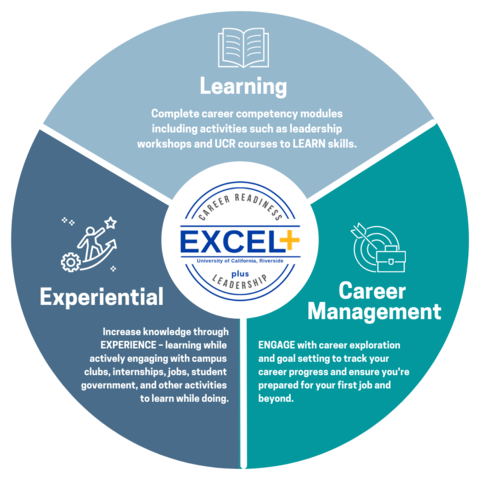
About
CAREER & GRADUATE SCHOOL READINESS
Did you know students who intern, volunteer in the community or participate in other forms of experiential learning are more likely to land a job after graduation or get into a graduate degree program? A degree demonstrates you have a specific set of skills related to that area, but employers and grad school admissions officers are looking for all the ways you have applied your classroom knowledge to real-world experiences.
In the EXCEL+ Career Readiness plus Leadership program, students:
Work through self-paced modules in Canvas consisting of LinkedIn Learning courses, UCR classes, and student success workshops to LEARN skills.
➤“Leadership always starts with learning, by studying and researching”
Increase knowledge through EXPERIENCE – learning while actively engaging with campus clubs, internships, jobs, student government, and other activities to apply learning to real-world situations.
➤“Leadership isn’t passive – you have to put it to the test and gain experience”
ENGAGE with career and graduate school exploration and goal setting to track your career progress and ensure you're prepared for your first job beyond.
➤“Leaders need a vision for success and clear goals for how to achieve it”
By completing activities in all three areas, students are given the tools to articulate their skills and leadership abilities with employers and graduate schools, and are shown to advance faster in their careers.
Job Outlook 2022 Spring Update, National Association of Colleges and Employers (NACE)
Research shows employers view college graduates as ‘mostly’ ready for entry-level jobs, however, they lack greater leadership skills to advance long-term.
Employers aren’t looking at individual candidate GPAs as much as they used to (46.3% as opposed to 75% from a little over two years ago). This means they are evaluating potential employees on a different set of attributes.
| Attribute | % of Respondents |
|---|---|
| Ability to work in a team | 81.0% |
| Problem-solving skills | 79.0% |
| Analytical/quantitative skills | 76.1% |
| Communication skills (verbal) | 73.2% |
| Communication skills (written) | 72.7% |
| Initiative | 67.8% |
| Leadership | 67.8% |
| Technical skills | 67.8% |
| Flexibility/adaptability | 65.9% |
| Strong work ethic | 65.4% |
